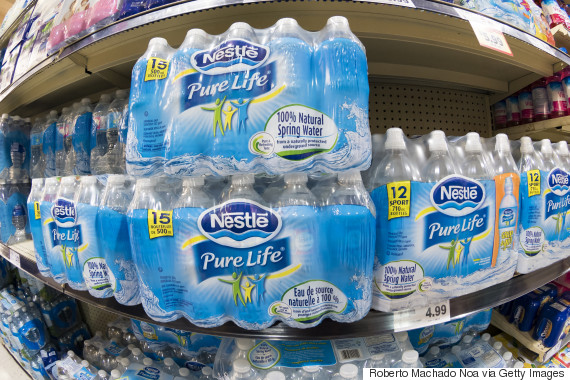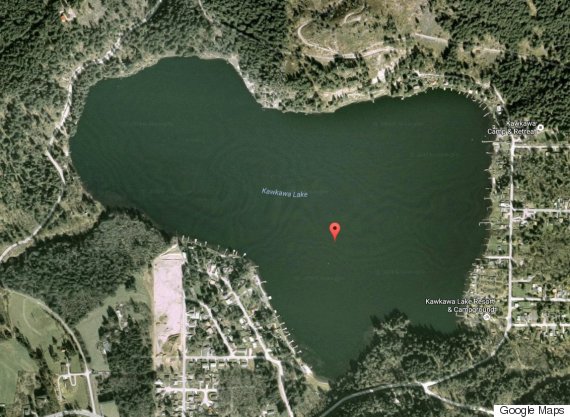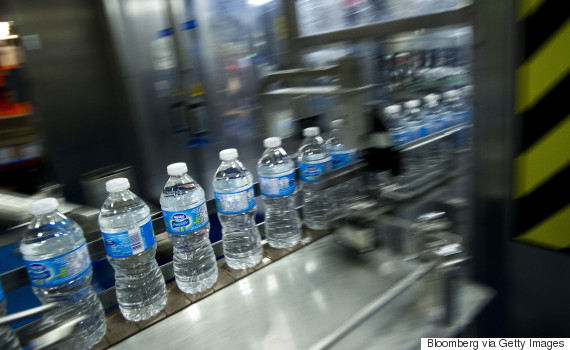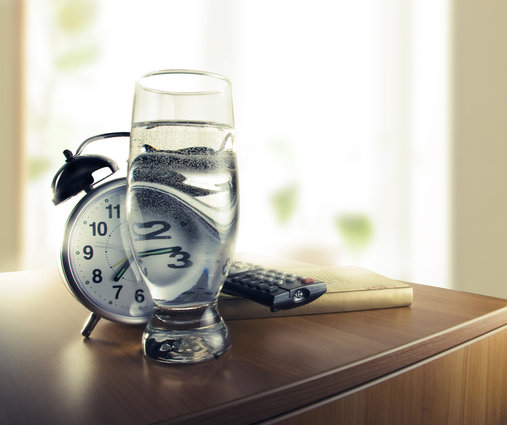Nestlé Isn't Alone, Every Damn Drink Maker Is Taking Our Water
Posted:

Nestlé bottled water in store shelf. Ontario's premier wants to change rules on how companies get water after Nestlé outbid the town of Wellington Centre for a well the community needed for drinking water. (Photo: Roberto Machado Noa/LightRocket via Getty Images)
If your Facebook feed is anything like mine, it is full of angry posts about Nestlé stealing our water.
A few days ago, the Council of Canadians launched a boycott of Nestlé to protest the multinational outbidding the municipality of Wellington, Ontario for a well.
"The water crisis is at our door here in Canada," said the group's chairwoman Maude Barlow. "We must safeguard groundwater reserves for communities and future generations."
The declaration makes clear this was something of a last-straw situation:
"In the middle of a severe drought in southern Ontario, bottled water giant Nestlé continues to extract four million litres of groundwater every day from an aquifer near Guelph. Nestlé pays less than $15 per day for this precious resource and then ships it out of the community in hundreds of millions of single-use plastic bottles for sale all over North America -- at an astronomical mark up."
To break that markup down, Ontario is charging $3.71 for every million litres of water. That's slightly more than B.C., which charges only $2.25 per million litres and sparked last year's 230,000-signature anti-Nestlé petition. Before this year, Nestle bottled more than 300 million litres of water from B.C. every year for free.
While the B.C. petition wanted Nestlé to pay more for water, the new one wants to dry up the market for their product at the source: "Wasting our limited groundwater on frivolous and consumptive uses such as bottled water is madness."

Nestlé draws water from close to Kawkawa Lake near Hope, B.C. (Photo: Google Maps)
The outrage has been building up over the past couple weeks, initially over Nestlé being allowed to keep taking up to 3.6 million litres of water daily from its well in Aberfoyle, near Guelph, Ont. despite local opposition and their water-taking permit expiring. There's even an anti-Nestlé protest happening at Guelph City Hall on Sept 26.
Ontario Premier Kathleen Wynn finally joined the chorus on Sept. 23, saying "the rules should be changed for bottled water companies... Water bottling is a different kind of industry and we need to treat it differently."
Yes, but...
Look, bottled water is bad for the environment but it is good for you. Not better than tap water, mind you, so there's no excuse for not bottling your own at home.
But other bottled beverages are also bad for the environment and they're bad for us. What do you think is the main ingredient in every single other drink we buy?
I get that bottled water is a culprit, and an avoidable one, but soda pop and other drinks are just as bad even if they've added sugar and flavour.
It's time to disrupt the entire beverage market's business model, which is to extract an ingredient for basically free and sell it for an absurd amount.
As Maureen Storey, spokesperson from the American Beverage Association, told NPRwhile defending her product's nutritional value: "Soda is comprised mostly of water. A full-calorie soft drink has 90 per cent water, and a diet soft drink is 99 per cent water."
She even admitted that her drinks are just water "with a little bit of flavouring and a little bit of sweetness."
That water comes from the exact same places that bottled water comes from, and it costs these companies the same ludicrously low rates.
Many places are banning bottled water but still allow bottled pop, juice and other drinks. But it's made from the same water causing the same damage to our rapidly diminishing freshwater reserves. It's the same packaging, too.
As the Quebec Bottled Water Association's Dimitri Fraeys said after Montreal announced their upcoming water bottle ban, "Water isn't the only thing in plastic bottles -- juice and carbonated drinks are also in plastic bottles. Drinking water is healthy. Why ban just the water bottles?"
Indeed, why not ban all plastic bottles? Or at least let's broaden our focus to all companies that sell our water back to us, whether or not they add sugar and flavour.

Bottles of Pure Life brand water move on the production line at the Nestle Waters Canada plant near Guelph, Ontario, Canada. (Photo: Kevin Van Paassen/Bloomberg via Getty Images)
Go on and boycott Nestlé. Here's a handy guide to all their products. But realize that despite Nestlé being a bad corporate citizen and the world's biggest bottler of water, boycotting them will not solve the problem.
The issue isn't just bottled water, it's that we allow companies to drain our water table for what amounts to free. Now in some cases, like farm irrigation, there's a public interest in this pricing because the water is used to produce food. Plus, agriculture and industry are using the water themselves.
That's not the case with beverage makers.
(Yes, this includes beer. Sorry. But don't worry, alcohol is a unique situation due to sin taxes. We could keep prices the same by increasing the cost of water and reducing alcohol taxes commensurately so that the government gets the same revenue but from the producer rather than the consumer.)
It's time to disrupt the entire beverage market's business model, which is to extract an ingredient for basically free and sell it for an absurd amount. We need to charge them a rate for that extraction that serves the public interest.
Their endgame here is to get out of paying because the focus has just been on bottled water.
The only danger is that "commoditizing" water may run afoul of free-trade agreements. They might force us to sell water to these giant companies even during droughts because water will be considered a "tradable good."
Maude Barlow has actually been warning about this since 1999. But we could always take water access rights away from these beverage corporations altogether until they join a push for a water exception to be included in international trade agreements.
Last August, Nestlé released a statement that read: "We fully agree that all groundwater users should pay their fair share to fund the management of our water resources and all users must be treated equitably."
Their endgame here is to get out of paying because the focus has just been on bottled water. To wit, Wynne said at that time that "30 years ago, we wouldn't have envisioned an industry that took water and put it in plastic bottles so that people could carry it around."
But guess what? Thirty years ago there was an even bigger industry that took water,inserted additives and put it in plastic bottles so that people could carry it around. People are drinking more water in 2016 because they are trying to be more healthy. We should encourage that.
And we should realize that Nestlé has a very good point about everyone being treated equally.
Let's charge all of them.
The cost of beverages will go up, sure, but that just means people will be paying the actual cost rather than subsidizing private profits with public water.
Plus, we'll just drink more tap water, which is better for the environment and better for our health.
Follow HuffPost Canada Blogs on Facebook
Also on HuffPost:
X


























No comments:
Post a Comment